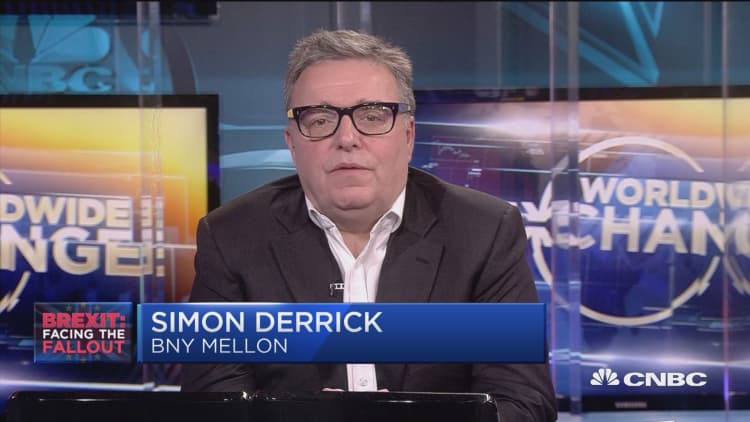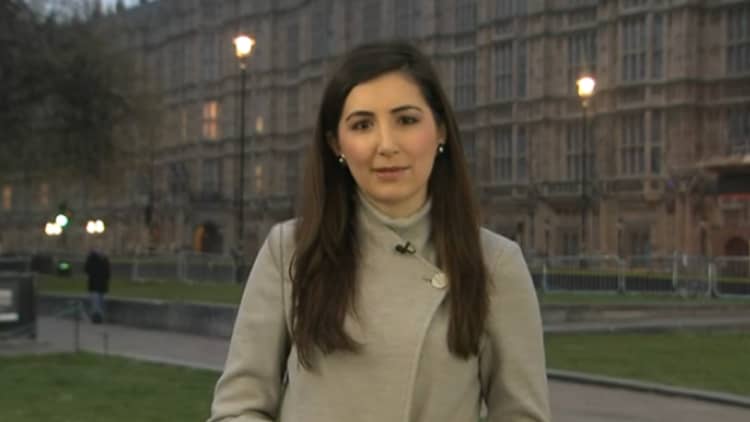The U.K.'s political future looks as uncertain as ever this week with cross-party talks over Brexit still bearing no compromise ahead of crucial decisions that need to be made.
Meanwhile on the continent, all eyes are on EU leaders who will meet Wednesday and must decide whether to grant the U.K. more time to leave the bloc, or not.
Last week, Prime Minister Theresa May requested an extension to Brexit to June 30 but there are strong signals of dissent in Europe over granting the U.K. more time; France, in particular, is not keen. The U.K. is due to leave the EU on April 12 if the EU does not grant the country an extension to Brexit.
A majority of U.K. lawmakers have rejected her Brexit deal three times, while also rejecting a no-deal Brexit and failing to reach a consensus for any alternative options. May has now resorted to holding talks with her political rival, Labour party leader Jeremy Corbyn, to find a way out of the Brexit impasse.
Talks have so far yielded little agreement, however, and are expected to continue Monday.
As it stands, if the EU refuses to grant the U.K. an extension to June 30 (or counter-propose a longer extension) the U.K. could be faced with a stark choice on Friday April 12 — leave the EU without a deal in place or revoke the whole departure process (known as Article 50) entirely.

The political uncertainty and confusion in the U.K. has riled politicians and the public alike with frustration over the length of time that Brexit is taking. Britain was originally due to leave the bloc on March 29 but was granted more time as no deal had been ratified.
European Parliament elections in late May are a key focus for the EU and Brexit is a complicated and unwanted distraction. There is therefore no certainty over what decision EU leaders will take Wednesday.
EU Council President Donald Tusk has suggested a one-year extension to Brexit but French President Emmanuel Macron has said there should be tough conditions imposed on the U.K. if it's given any further time.
Irish Prime Minister Leo Varadkar said Saturday that he considered it highly unlikely that EU leaders would veto a proposal to grant Britain more time, however, and that any country that did "wouldn't be forgiven for it." May is due to hold talks with Macron and German Chancellor Angela Merkel ahead of the EU summit.
Holger Schmieding, chief economist at Berenberg Bank, said the bank expects the EU to "reluctantly grant the U.K. a further Brexit delay" just because the alternative — "a hard Brexit with even more political chaos in a country that will remain a close neighbour, is just too bad."
"Most of the cautious comments by EU27 decision makers point that way. Still, deciding unanimously at the 10 April emergency summit to give the U.K. even more time to sort itself out will not come easy for the EU27. It raises serious concerns and a grave tail risk," he said in a note Monday.

"The EU27 may ask why a new delay should finally help the U.K. to get its act together if the first delay has not done the trick."
May has been criticized by pro-Brexit members of her own Conservative Party and Northern Ireland's Democratic Unionist Party (DUP) on whose support she has relied upon in a minority government.
She has defended her decision to talk to Labour, however, tweeting a video Sunday in which she said she could not see Parliament accepting her Brexit deal after it was rejected three times and that "the choice that lies ahead of us is either leaving the European Union with a deal or not leaving at all."
'Schrodinger's Cat'
Brexit has been the main focus point for sterling for months and the currency fell to a one-week low of $1.2987 on Friday as France and the Netherlands expressed doubt about May's plan to further delay Brexit. It had rebounded Monday to trade at $1.3064. London's FTSE 100 index trading lower Monday morning.
Simon Derrick, the chief currency strategist at BNY Mellon, likened sterling's state of limbo to the thought experiment called "Schrodinger's Cat" — the paradox of a cat being placed in a box with something that could kill it — but the observer not knowing whether it is alive or dead (and thus the cat is both alive and dead) before the box is opened.
Similarly, sterling's fate can't be known until the end of the week, Derrick told CNBC on Monday.
"(Sterling is like) Schrodinger's currency," he told CNBC's "Squawk Box Europe."
"It's worth either $1.50 or $1.10 dependent on the outcome of Brexit but you don't know until that happens. Until you open the box you don't know and Brexit is the box."
Derrick noted that the $1.30 price has been the average price against the dollar since the 2016 referendum "and here we are stuck to it."
"It is entirely possible that by the end of the week we get to the point of finding out that we've actually opened the box," he added.
There's "a perfectly reasonable chance" that the prime minister goes to the European Council with no plan on Wednesday, Derrick said, and it was also "entirely possible that France, Spain and possibly Belgium go 'no plan, no extension' and that at the end of the week we're looking at making a choice," Derrick added.
"The choices are between a no-deal Brexit or revocation … It's by no means clear what the actual result would be … It's entirely possible that you could have a no deal Brexit, it's equally possible that it might be revoked," he said.
Accidental disorder
The Bank of England (BOE) forecast last November that a no-deal Brexit — in which there is no transition period allowing the U.K. to adjust to life outside the bloc — could cause the U.K.'s economy to shrink by 8% and warned that house prices could drop by a third.
Last week, BOE Governor Mark Carney again warned of the risks of a no-deal Brexit, telling Sky News that an "accidental disorderly" no-deal Brexit could happen. The latest growth data released March showed the U.K. grew 0.2 percent in the fourth quarter, from the previous quarter.
Economists say the economy is already being damaged by businesses holding back investment. "There are different parts of the economy which are affected but probably the one which is affected the most is the business investment," George Buckley, chief U.K. & European Economist at Nomura, told CNBC Monday.
"If you're a company thinking of investing and you're faced with this uncertainty why would you invest in the U.K. right now rather than wait it out and make sure you have more clarity over what situation you'll be facing."


